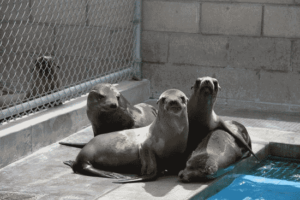Marine Mammal Stranding
 Spring is breeding season for much of Crystal Cove’s wildlife, and every inch of the park is bursting with new life. If you come to the park you can spot tiny house finch chicks chirping from their nests, fluffy desert cottontails hopping across the trails, and maybe even a gray whale cow and calf hugging the coast on their way up to Alaska from Baja. This sudden population growth may be causing trouble for some of our local marine mammals. Seals and sea lions that were born in late winter are just starting to set out on their own, and many seem to be struggling to find food. The Pacific Marine Mammal Center in Laguna Beach is caring for 33 starving elephant seal pups, many of which were found stranded in Crystal Cove.
Spring is breeding season for much of Crystal Cove’s wildlife, and every inch of the park is bursting with new life. If you come to the park you can spot tiny house finch chicks chirping from their nests, fluffy desert cottontails hopping across the trails, and maybe even a gray whale cow and calf hugging the coast on their way up to Alaska from Baja. This sudden population growth may be causing trouble for some of our local marine mammals. Seals and sea lions that were born in late winter are just starting to set out on their own, and many seem to be struggling to find food. The Pacific Marine Mammal Center in Laguna Beach is caring for 33 starving elephant seal pups, many of which were found stranded in Crystal Cove.
Northern Elephant seals aren’t a common sight on Crystal Cove’s beaches. They live most of their lives in the open ocean, only hauling out on beaches during the breeding season at their breeding grounds. However, in less than one week, four elephant seal pups washed up on Crystal Cove’s shores, dehydrated and malnourished. In 2015 and 2016, we saw something similar happening with California sea lion pups. Thousands of starving young sea lions were found all along California’s coast. The culprit was warm ocean temperatures leading to a decline in the fish they feed on. It’s unclear what is causing the sudden increase in elephant seal stranding this season, but it could indicate a significant change in the marine ecosystem that they rely on.
Elephant seals aren’t the only ones in trouble this year. The Pacific Marine Mammal Center has also seen a dramatic increase in stranded sea lions due to domoic acid poisoning caused by marine algal blooms. California received record rainfall following many abnormally dry years. This washed years of built up fertilizers and other pollutants into the ocean, resulting in sudden blooms of marine algae. Some of these algae produce a neurotoxin that is ingested by fish that are then eaten by sea lions. The result is an unprecedented number of sea lions coming to shore disoriented and lethargic.
So, if you come to Crystal Cove and find a starving elephant seal pup or a confused sea lion, what should you do? The most important thing is to leave the animal alone, and keep your distance. If you think the animal looks unhealthy, you can call the Pacific Marine Mammal Center at (949) 494-3050 and describe your location and the condition of the animal in as much detail as possible. If you would like more information about the Pacific Marine Mammal Center, or want to keep track of their patients, visit their website at www.pacificmmc.org.
